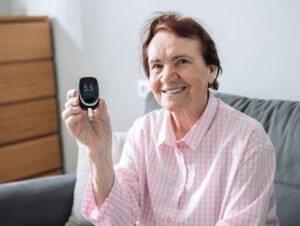- Categories :
- More
Diabetes in Seniors: Risks and Strategies for Living Well

November is American Diabetes Month, a time dedicated to increasing awareness, improving education, and supporting millions of Americans living with diabetes. For seniors — the age group most affected by the condition — this month serves as an important reminder of the growing prevalence of diabetes in later life and the urgent need for effective, individualized care.
Diabetes remains one of the most significant health concerns facing older adults, affecting nearly a nearly a third of seniors aged 65 and older, according to the CDC. As the population ages, the number of seniors living with diabetes continues to rise, prompting renewed attention from healthcare providers, caregivers, and families.
At the same time, advances in treatment, technology, and support have reshaped how diabetes can be managed later in life — often more safely, comfortably, and effectively than ever before for seniors living with diabetes.
Senior Diabetes: A Growing Trend with Complex Challenges
The steady increase in diabetes among seniors reflects both longer life expectancy and decades of exposure to risk factors like high blood pressure, high cholesterol, and sedentary lifestyles. But age brings its own biological changes as well. Natural shifts in metabolism, muscle mass, and insulin sensitivity make older adults more prone to developing type 2 diabetes and experiencing complications once diagnosed.
In recent years, clinical guidelines have evolved with greater emphasis on personalization. Healthcare providers now tailor diabetes goals and treatment plans based not just on lab numbers, but on a senior’s overall health, functional ability, existing conditions, and day-to-day living situation. This individualized approach acknowledges that a healthy 70-year-old has different needs than an 85-year-old managing multiple chronic conditions.
The Unique Risks of Diabetes for Aging Adults
Living with diabetes at an older age can be more complicated and potentially dangerous. Seniors are more vulnerable to hypoglycemia — episodes of low blood sugar that can lead to dizziness, confusion, falls, or hospitalization. Vision loss, nerve damage, kidney disease, and cardiovascular complications remain serious concerns, particularly for those who struggle to manage medications or maintain consistent routines.
Cognitive changes and memory loss can further complicate diabetes care, making it harder to remember doses, recognize symptoms, or follow dietary guidelines. Many older adults also take multiple medications for other health issues, increasing the risk of harmful interactions or missed doses.
Despite these risks, early detection and consistent monitoring can significantly reduce complications. Routine screenings, regular provider check-ins, and supportive care can help seniors maintain quality of life and avoid preventable crises.
Modern Approaches to Daily Management of Blood Glucose
Managing diabetes in later life has become more flexible and supportive than in the past. One of the most important shifts has been moving away from strict one-size-fits-all targets. Many seniors benefit from more moderate blood sugar goals that emphasize safety — especially avoiding low blood sugar episodes — rather than aggressive control.
Continuous glucose monitors (CGMs), simplified glucometers, and user-friendly medication tools have also made diabetes management more accessible, particularly when caregivers or family members are involved. For some older adults, technology brings peace of mind; for others, a simplified routine without complex devices may be the better choice. The key is to match tools to the individual.
Another major advancement is the growth of Diabetes Self-Management Education and Support (DSMES). These programs teach older adults how to manage medications, plan meals, monitor glucose levels, and recognize early complication signs. Many programs are now offered through telehealth, which is especially helpful for homebound or mobility-limited seniors. Medicare often covers these services, making them a vital and accessible resource.
The Importance of Whole-Person Support for Senior Diabetics
Diabetes management extends beyond glucose readings. Seniors often need help with nutrition, safe physical activity, emotional wellness, medication management, and maintaining consistent routines. For many, family caregivers or professional in-home care providers are essential partners in daily support.
Effective diabetes care also depends on communication between primary care providers, specialists, pharmacists, and caregivers. Seniors benefit most when everyone involved understands the care plan and works together to adjust it as needs change.
Support That Helps Seniors Manage Diabetes with Confidence
As we observe American Diabetes Month, take time to evaluate how well you or your aging loved one is managing their diabetes and whether additional support could improve safety, comfort, and overall health.
Managing diabetes can be overwhelming for seniors and their families, but they don’t have to navigate it alone. Professional in-home care can provide medication reminders, healthy meal preparation, mobility support, transportation to medical appointments, and daily monitoring to help prevent complications.
If you or a senior loved one is living with diabetes and needs extra support at home, contact your local Amada Senior Care office. Our trained caregivers can help create safer routines, reinforce care plans, and provide the compassionate assistance seniors need to stay healthy and independent. CLICK HERE to find your local Amada Senior Care office.

















